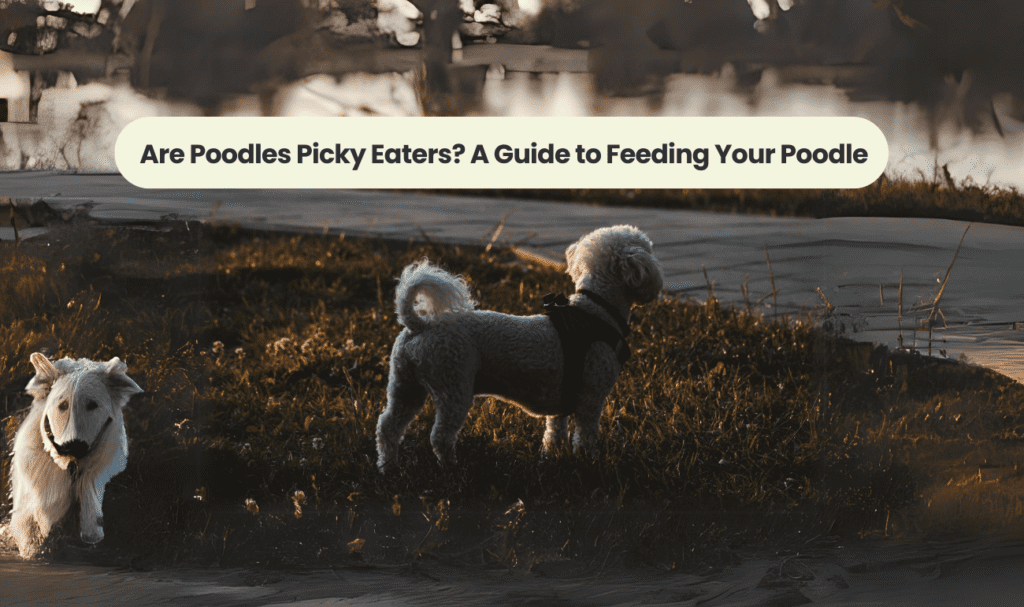The intelligent, graceful, and curly-coated poodle is a well-known dog breed. However, not all Poodles share my enthusiasm for food. No one else shares your concern about the amount of food your Poodle eats. The search for a tasty food that their Poodle would savor is a common one among pet owners. A healthy and enjoyable mealtime experience for your cherished Poodle is within your reach with the help of this comprehensive guide that delves into the issue of Poodles and their finicky eating habits.
- Understanding Picky Eating in Poodles
- How Much Should a Poodle Eat?
- Feeding Guidelines for Poodles
- Choosing the Right Food for Your Poodle
- Addressing Picky Eating Behavior
- 1. Establish a Consistent Feeding Schedule
- 2. Avoid Frequent Food Changes
- 3. Add Flavorful Toppers or Mix-Ins
- 4. Provide Interactive Feeding Toys
- 5. Stay Calm and Avoid Reinforcing Picky Behavior
- 6. Monitor Your Poodle’s Weight and Health
- 7. Seek Veterinary Advice if Necessary
- FAQ’s
- Conclusion
Understanding Picky Eating in Poodles
The peculiar feeding habits of a Poodle are just one more way in which their one-of-a-kind personalities shine through. Some Poodles will wolf down whatever you give them, while others may develop strong aversions to particular foods or lose interest in their usual fare. Poodles’ health, age, and surroundings are just a few of the variables that can affect their pickiness when it comes to what they consume.
Factors Contributing to Picky Eating
1. Age
Puppies of all breeds, but especially Toy Poodles, are notoriously finicky eaters. It may take some time for their developing taste buds to adapt to novel textures and flavors. It is essential to provide children with a nutritious, balanced food as they are growing up to ensure optimal development.
2. Health Issues
Poodles’ finicky feeding habits might indicate a more serious medical problem. Their hunger levels can drop due to stress, gastrointestinal sensitivity, or dental issues. See your vet immediately to rule out serious health issues if you observe a dramatic shift in your Poodle’s eating habits or if they persistently refuse food.
3. Environmental Factors
Because poodles are sensitive canines, their environment might have an effect on how they eat. Stress and changes in appetite might result from environmental changes like moving to a new house or being around loud noises. If they experience anxiety when eating, making their eating space relaxing and pleasant can assist.
How Much Should a Poodle Eat?
Making sure your Poodle gets the correct amount of food depends on your knowledge of their nutritional requirements. Overfeeding and underfeeding can have negative impacts on their health, therefore it’s important to limit portions. Age, weight, activity level, and food type all play a role in determining how much food your Poodle needs.
Feeding Guidelines for Poodles
Poodles come in different sizes, including toy, miniature, and standard. Each size has its own specific nutritional requirements. Here are some general feeding guidelines to consider:
| Poodle Size | Daily Food Intake |
| Toy | 1/4 – 1/2 cup |
| Miniature | 1/2 – 1 cup |
| Standard | 2 – 3 cups |
Please note that these are only approximate measurements and that you should cater the serving quantity to your Poodle according to his or her own requirements. Consult your veterinarian for individualized feeding advice if you’re uncertain about the correct amount to feed your Poodle.
Also Read: Why do poodles lick so much ?
Choosing the Right Food for Your Poodle
A well-rounded diet for poodles should consist of nutritious fats, high-quality protein, and other necessary components. If you own a Poodle, it’s important to feed it a commercial dog food that is prepared for its size and life stage. If your Poodle has food sensitivities, it’s best to steer clear of foods that are heavy in fillers or artificial additives.
Addressing Picky Eating Behavior
Now that you understand the factors that can contribute to picky eating in Poodles, let’s explore some strategies to help address this behavior and ensure your Poodle enjoys their meals.
1. Establish a Consistent Feeding Schedule
You can control your Poodle’s hunger and make mealtimes more regular by establishing a regular feeding routine. Consistently feed your Poodle in a peaceful and serene setting at the same times daily. Keep food out of the reach of pets all day long to prevent weight gain and finicky eating.
2. Avoid Frequent Food Changes
For fussy eaters, consistency is crucial. Your Poodle’s finicky habit will be reinforced if you constantly introduce new foods in an effort to discover what they appreciate. Make sure you consistently feed your dog a high-quality dog food that addresses all of their nutritional needs. If you do decide to change their diet, give them 7–10 days to acclimate before making any drastic changes.
3. Add Flavorful Toppers or Mix-Ins
If your Poodle refuses to eat their normal food on a daily basis, try giving them tasty toppings or mix-ins. To make their kibble taste even better, you can add a pinch of freeze-dried meat, some low-sodium chicken broth, or some fish oil. Be careful that whatever you provide your Poodle is healthy and appropriate for its diet.
4. Provide Interactive Feeding Toys
You may make mealtimes more interesting and fun for your Poodle by stimulating their thinking while they eat. Think about getting your Poodle a puzzle feeder or an interactive feeding toy so they have to work for their food. As an added bonus, these toys help keep little ones’ minds active as they eat.
5. Stay Calm and Avoid Reinforcing Picky Behavior
Stay cool and don’t reinforce your Poodle’s fussy behavior if it refuses to eat, even if it’s normal to feel worried. You should not give them treats or human food in place of their normal meals. This further supports the notion that choosing not to eat results in better choices.
6. Monitor Your Poodle’s Weight and Health
Keeping an eye on your Poodle’s weight and general health is essential, but it becomes much more important if they have fussy eater tendencies. Make sure they stay in good shape by keeping tabs on their weight and BMI. Talk to your vet if you see any major changes; they can diagnose and treat any underlying health problems or help you figure out how to adapt their food schedule.
7. Seek Veterinary Advice if Necessary
It is critical to consult a veterinarian if your Poodle’s finicky eating continues or is along with other worrying signs. An in-depth evaluation by a vet might reveal any hidden health issues with your Poodle and offer advice on how to overcome its finicky eating habits.
FAQ’s
Why is my poodle a picky eater?
Your poodle might be a picky eater due to various reasons such as dental issues, gastrointestinal problems, food allergies, or simply a preference for certain textures or flavors.
Which dog breed is the most picky eater?
While individual preferences can vary, some breeds known for being picky eaters include Shih Tzus, Yorkshire Terriers, and Maltese dogs.
Why doesn’t my poodle eat?
There could be several reasons why your poodle isn’t eating, including stress, illness, changes in routine, or simply not liking the food provide
How to get a fussy poodle to eat?
To encourage a fussy poodle to eat, try offering a variety of high-quality dog foods, warming the food slightly to enhance aroma, establishing a consistent feeding schedule, incorporating tasty treats or toppers, and consulting with your veterinarian if the issue persists.
Conclusion
Picky eating in Poodles can be a frustrating experience for both owners and their furry companions. By understanding the factors that contribute to picky eating and implementing practical strategies, you can help ensure that your Poodle receives a balanced and nutritious diet. Remember to provide a consistent feeding schedule, choose high-quality dog food, and avoid reinforcing picky behavior. With patience and proper care, you can help your Poodle develop healthy eating habits and enjoy mealtime to the fullest.

